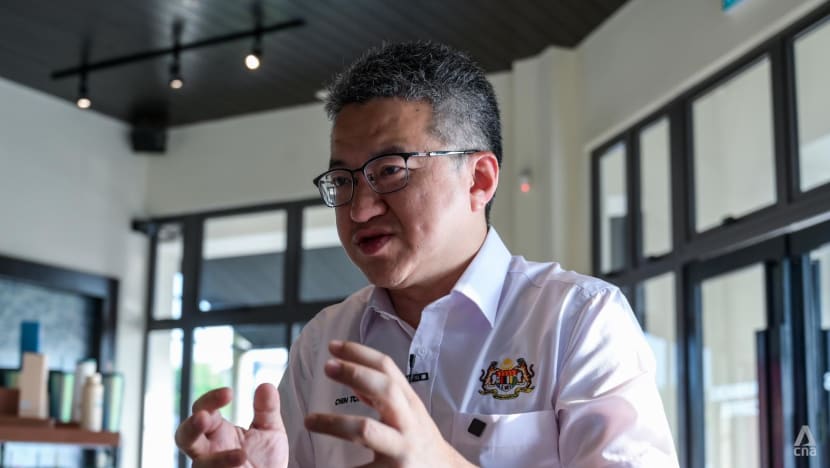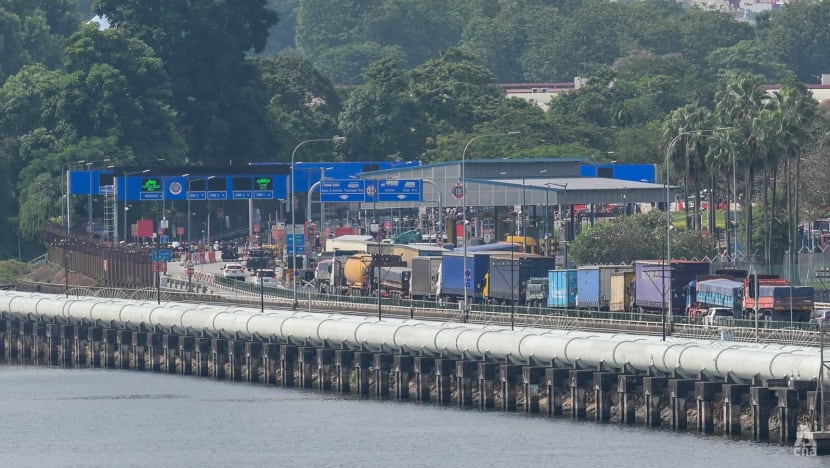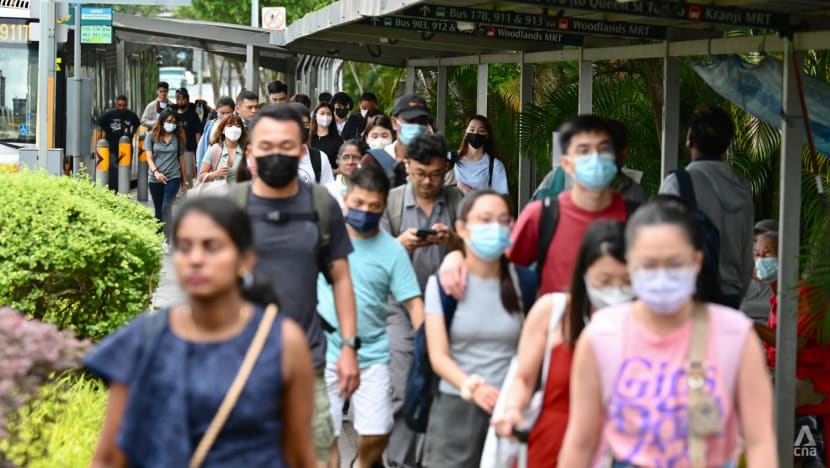Weaker ringgit draws more Johoreans to work in Singapore, leaving manpower shortages in state's key sectors
In the first of a two-parter on Johor’s manpower challenges, CNA looks at how a weaker Malaysian currency has worsened its worker shortages, such as lacking 2,800 healthcare workers in public hospitals.

Travellers making their way to Bangunan Sultan Iskandar to cross the Woodlands Causeway and enter Singapore. Every day, thousands of Johoreans wake up early in the morning to travel to Singapore for work in pursuit of a better salary. (File photo: CNA/Fadza Ishak)
JOHOR BAHRU: To get to work daily, nurse Bavanee Kengkan has to first drive from her Skudai home to a bus stop in Gelang Patah, then hop on a public bus and cross the Tuas Second Link before taking another bus to reach her workplace in the western part of Singapore.
It’s a 90-minute backbreaking journey - worsened oftentimes by traffic jams - that she has been making between her home and work over the last decade.
In spite of the cumbersome commute, Mdm Bavanee firmly believes that choosing to seek employment in Singapore remains one of the best decisions she has made in her life - and it all boils down to earning a higher salary for her family to live comfortably.

“Before I resigned as a nurse in 2014 in Malaysia, my basic salary was just RM2,700 (S$788.19) per month. In Singapore, the basic salary for a junior nurse at the time was around S$2,500 and that’s already equivalent to more than RM7,000. It makes a world of difference,” she said.
“Within two years I was able to settle the family’s debt for our home and (the loan for) a van - which my husband bought for his business. The extra income gave us peace of mind,” said the mother of a 10-year-old girl, who said her pay has increased at a “fair rate” annually, though she declined to reveal her income details.
The phenomenon of Johoreans seeking work across the Causeway for a higher disposable income is not new. The proximity to Singapore as well as the prospect of earning a salary two to three times what they would otherwise be paid in Johor are persuasive reasons.
But the recent depreciation of the Malaysia Ringgit against the Singapore Dollar has lured even more skilled Johoreans to seek jobs across the Causeway and those already working in Singapore, to continue doing so.
As of Tuesday, the value of the Singapore dollar against the Malaysia ringgit was 3.4271 according to a Bernama report. This is up 7.09 per cent from about 3.20 in July 2022.
This has led to more pressure on some economic sectors in Johor which are already hit by attrition over the last three years due to the COVID-19 pandemic.
Deputy Minister of Trade, Investment and Industry Liew Chin Tong told CNA that the federal government was acutely aware of the issue and that it has been vying to drive wages up in the southern state.

"Every morning, tens of thousands of Malaysians on their motorbikes head to Singapore, at 4am, 5am. They are working in jobs that pay S$2,000. That is partly because in Malaysia, wages are very low… probably a third of the pay they earn in Singapore and in terms of currency conversion, there is a huge gap.
“So it makes a compelling case for ordinary Malaysians to work in Singapore. In Malaysia, we will have to push wages up by attracting higher investment into technology, automation and digitalisation,” said Mr Liew, who is also Member of Parliament for the Iskandar Puteri constituency in Johor.
HEALTHCARE AND F&B SUFFERING FROM SHORTAGE
In May 2022, the Johor government announced that it would set up a special task force to tackle employment issues as well as the “brain drain phenomenon” to Singapore.
The state’s human resource committee chairman Mohd Hairi Mad Shah outlined then that Johor was “experiencing a lack of local workers for several main economic sectors in Johor such as service, commodities and manufacturing”.
He added that when the land borders reopened from COVID-19, many Johoreans received offers to work in Singapore and that the “currency exchange rate favours those earning Singapore dollars”.
More than a year on, the problem continues to plague Johor.
Johor Health and Unity Committee chairman Ling Tian Soon told CNA recently that “it is no secret” that the healthcare sector is experiencing a manpower shortage.
“We are lacking 2,800 nurses in the public hospitals, and that’s not including the nurses in the private hospitals,” said Mr Ling.
“We are working with the health ministry … and we have to train more nurses locally. Hopefully within one to two years, we will be able to increase the quantity of younger nurses in our hospitals across the state,” he added.
Regional manager for private healthcare facility Columbia Asia, Madam Rahani Yaakob, who oversees the hospital’s two branches in Johor - Tebrau and Iskandar Puteri - told CNA that the nurse shortage in Johor particularly has been “severe”.
“Some work for a couple of years before finding options in Singapore where they get better pay. We cannot help it. Right now we are looking outside of the country as options for our nurses,” added Mdm Rahani.
She added that the two Johor hospitals have seen huge demand for beds, including from foreign medical tourists, but acknowledged that due to a shortage in nurses, it has been difficult to meet this demand. The company says it is unable to provide specific numbers.
Meanwhile, the problem is also pervasive in the food and beverage industry.
Johor Bahru Cooks Association president John Ang told CNA that over the last year, the number of chefs and cooks across restaurants in the city has declined by 40 per cent, based on feedback from his association colleagues.
“Because of the currency, many of the staff have run to Singapore and it's difficult to entice them to come back,” said Mr Ang.

“The exchange rate these days is around 3.4, so that means if they earn around S$2,000 in Singapore, this is already close to RM7,000, and many restaurants in Johor cannot afford to pay their cooks half this amount,” he added.
He added that based on his observations, chefs hired by Singapore firms were generally those who are more skilled in the trade.
“Those who are targeted by the Singapore firms are those who are more skilled, experienced and can generally do the work of two to three people,” said Mr Ang, who is also the co-founder of Grand Senibong Seafood Restaurant in Masai, Johor.
“This creates a vacuum in Johor because now there are less skilled chefs in Johor Bahru.”
Mr Ang acknowledged that the shortage in chefs and waiters in the city has led to longer waiting times and more unpleasant customer experiences.
“Restaurants in Johor Bahru remain popular but sometimes due to labour shortage, we are just unable to meet the high demand and keep all our customers happy,” he added.
An executive chef, who worked at a JB restaurant prior to the COVID-19 pandemic and wanted to be known only as Mr Lim, is one example of a Johorean who found work in Singapore recently.
Mr Lim was retrenched from his job when the JB eatery he worked at shut its doors during COVID-19. He told CNA that working in Singapore would not only allow him to triple his wages, but also room to grow as a chef.
He found a job posting on Facebook for a cook at a steak eatery in Tanjong Pagar and started working there in February.
“I have not looked back since,” said the 42-year-old. “I think working in Singapore opens up more doors and allows me to work with the best in the region.”
Mr Lim rents a room in a HDB flat in Bukit Merah as it would be convenient to travel to work. He returns home to see his parents in Johor Bahru once a month.
He said that in spite of Singapore’s higher costs of living, the better salary he’s getting still makes financial sense.
“In Singapore, I pay more for rent, food, and transport than back in Johor Bahru. But the higher salary covers these expenses and still leaves me more disposable income to pay for the things I want to spend on,” added Mr Lim.
JOHOR FIRMS MUST CLOSE SALARY GAP WITH SINGAPORE TO AT LEAST TWO-THIRDS: DEPUTY MINISTER
Economist Lee Heng Guie, who is executive director of think-tank Socio-Economic Research Centre, told CNA that both the federal government and the Johor state government will have to address the root causes of the issues by raising local workers’ incomes through a longer-term approach.
He suggested implementing a scheme similar to Singapore’s Progressive Wage Model (PWM) that seeks to raise salaries of low-income workers in the Republic by developing their skill sets through a career progression plan agreed on by the government, union and businesses.
Malaysia currently implements the minimum wage model. In May, the country’s minimum wage was raised from RM1,200 to RM1,500.
Mr Lee said the most significant difference is that the PWM incentivises employees to seek out a pay increase by upgrading their skills.
“But the employers need to provide upskilling and reskilling to their employees; and adopt sustainable and inclusive business practices – a balanced work-life balance culture. The employees must commit to self-development to upskill and enhance their employability,” he added.
Deputy Minister Liew told CNA that Johor will be better able to retain its manpower if it is able to offer salaries that are around two-thirds what is being offered across the Causeway. He said this will be achievable especially in the manufacturing sector.

“Many Malaysians who are working in Singapore at S$2,000 and below … we are talking about offering them RM5,000,” said Mr Liew.
Agreeing, Mr Ang said that one solution to retain talent in Johor is for local companies to offer higher wages.
For Grand Senibong Seafood, he said that the executive chefs all earn upwards of RM15,000 to ensure they remain committed and their heads are less likely to be turned by offers from Singapore.
"Operators in JB have to offer a competitive salary if we want to retain talent. If we can match, we must try," said Mr Ang.
"If we cannot offer up to RM7,000, I think RM4,000 is fair, considering many workers can save more since the cost of living in Johor is cheaper and our restaurant offers them accommodation via a living quarters," he added.
However, Mr Thomas Mathew, chief executive of Talent Corporation Malaysia (TalentCorp), told CNA that it may be unrealistic to expect Johor companies to raise local employees' wages to two-thirds of what Singapore businesses are offering.
Johor firms will have to factor in existing operational costs as well as account to shareholders for any spike in manpower expenses, said Mr Mathew, whose agency is set up by Malaysia’s Ministry of Human Resources to attract and retain the right talent as well as expertise to boost Malaysia’s economy.
“So it must be market forces that actually determine finally where wages are at,” he added.
Sunway University economics professor Yeah Kim Leng suggested that employers unable to raise wages may look to recruit employees from other states in Malaysia “that are facing youth unemployment and underemployment issues”.
He added that the onus also falls on the local government to boost employability of Johoreans and arm them with the skill sets to pounce on job opportunities brought by potential investment in the state.
“Singapore’s continuing economic progress and widening income gap with Malaysia suggests that the influx of Malaysian workers (into the republic) will persist,” said Dr Yeah.
“It’s only when Malaysia increases its employment opportunities and reduces the wages (disparity) with Singapore - only then will fewer Johoreans cross the border to find work.”


















